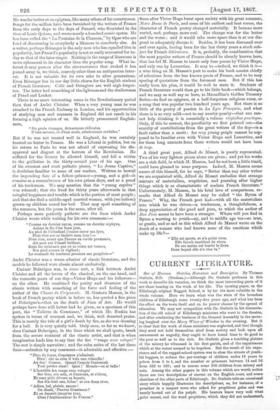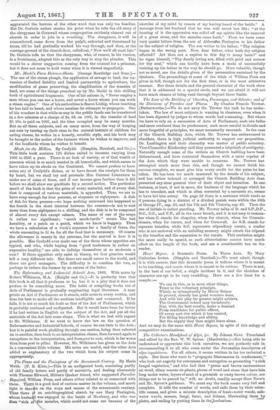CURRENT LITERATU RE.
Out of Harness. Sketches, Narrative and Descriptive By Thomas Guthrie, D.D. (Strahan.)—Although Dr. Guthrie professes in this work to describe his vacation, we think the most interesting parts of it are those bearing on the work of his life. The opening paper, on the Edinburgh original Ragged School, is by far the most valuable in the whole volume. Here we learn what was the state of the homeless, children of Edinburgh some twenty-five years ago, and what has been the effect on the town itself and on its poorer classes by the spread of education. We may not sympathize with Dr. Guthrie in his denuncia- tion of the old school of Edinburgh ministers who went to the theatre, and after conducting the business of the General Assembly in the morn- ing laughed over the Merry Wives of Windsor in the evening. But it is clear that the work of these ministers was neglected, and that though they need not hold themselves aloof from society and look upon all amusement as ungodly, they ought to have found time to do good to the poor as well as to the rich. Dr. Guthrie gives a touching picture of the misery he witnessed in his first parish, and of the experiences. which at the outset seemed to be hopeless. But the result of his expe- rience and of the ragged-school system was to clear the streets of youth- ful beggars, to reduce the per-centage of children under 14 years in prison from 5 to 1, and the number or prisoners between 14 and 16 from 552 to 180; and to rescue some 500 children from misery and min. Among the other papers in this volume which are worth notice there are two descriptions of storms on the English coast, and some sketches of the older parts of Edinburgh. Dr. Guthrie tells an occasional story which happily illustrates his descriptions, as, for instance, of a preacher in a seaport town who asked for propitious gales and was nearly hooted out of the pulpit. His hearers knew very well what gales meant, and the word propitious, which they did not understand,
aggravated the horrors of the other word that was only too familiar. But Dr. Guthrie rather strains his point when he tells the old story of the clergyman in Cornwall whose congregation suddenly cleared out of church in order to join in a wrecking. The clergyman, it will be remembered, came down from the pulpit, exhorted and threatened by turns, till he had gradually worked his way through, and then, at the vantage-ground of the church door, called out, "Now we'll all start fair." Dr. Guthrie tells us that the clergyman, who, of course, in his version, is a Scotchman, adopted this as the only way to stop the plunder. This would be a clever suggestion coming from the counsel for a prisoner, but it does not seem to hold water when it is viewed impartially.































 Previous page
Previous page